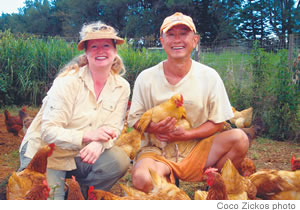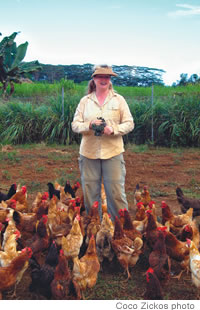Fresh Eggs From The Chicken Spa

Kelly and Yuichi Sato with some of their ‘girls’
Chickens at Sato’s Organic and Sustainable Farms thrive in a clean, cage-free environment
No salmonella in these eggs.
Fondly referring to her 140 chickens as “my girls,” Kelly Sato and husband Yuichi proudly show off their quaint farm spanning one acre of land in Kilauea, Sato’s Organic and Sustainable Farms.
“We told the girls they could take the day off, but they didn’t listen,” Kelly says with a giggle.
Plucking the ground for bugs or safely nestled in their coop, the chickens seem content living in an environment most hens would likely be jealous of.
“We call it the chicken spa,” she says about her “healthy and happy girls.”
And unlike the recent salmonella outbreak on the Mainland, one would be hard-pressed to find anything wrong with these eggs. Not only are all of the chickens allowed to roam in a clean, cage-free environment, they also are fed an all-natural diet which consists of rice, vegetables from the farm and various leftovers such as bread and fish from small, local businesses across the island.
If all chickens were able to live in a similar cage-free manner, it would “cut chances of salmonella by half,” Kelly says. “We hope these kind of situations will help open the eyes of people for them to really start to understand the importance of eating local and supporting local.”
And to truly make the local farm live up to its self-sufficient, small-business ways, the “girls,” in turn, fertilize the grounds and remove bugs and weeds from the area. This contributes to the growth of various fruits and vegetables, as the chickens are rotated every few months after harvest, alternating between four different 8,000-square-foot sections.
“The way we do our rotation, we could farm here indefinitely, whereas a lot of farmers pack their acreage with nothing but vegetables and just produce, produce, produce,” Kelly says. “But at some point, the soil is going to need to rest, and it’s going to give out on them and they’re not going to get the production they had.”
SOS Farms continuously has fallow states, and even after the chickens are moved out of an area and before the next crops are produced, buckwheat is planted which serves as a “savings account” for the “nitrogen bombs the girls just left,” Kelly says.
“The goal is to have a self-sustainable lifestyle … not to import anything,”Yuichi says.

Kelly Sato’s chickens not
only provide eggs, but help fertilize the farm, too
Even the delivery of their products to residents on the North Shore is a part of their eco-friendly business package. For example, one location in Princeville allows the duo to deliver to five houses at once, rather than each individual family driving to Kilauea for pickup.
“This saves gas and time,” Yuichi says.
The Eat Local Service SOS Farms maintains lets members order exactly what they want each week, such as parsley, kale, soybeans, bananas, cucumbers and eggs – all freshly picked and packaged from the gardens. And although there is currently a waiting list to become a member of the service, people also can find SOS Farms selling its products Saturday at Kilauea Farmer’s Market.
Buying local and organic might be more expensive, Kelly concedes but “you can pay the farmer now or pay the pharmaceutical company later.”
Each day after a vegetable is harvested, it loses 10 percent of its vitality. And after a week there is nothing left but fiber “and you’re not getting your minerals and micro-nutrients,” she says.
So while organic products might be more expensive and time-consuming to create, the Satos wouldn’t do business any other way.
“Our goal isn’t more production … we have exactly what we need to support ourselves and have a good solid living,” Kelly says. “It’s just enough. We don’t need more space, we don’t need to keep growing and having more and more to be able to pay the fertilizing bill and pesticide bills.”
And they will continue to do everything they can to fulfill the demand for quality eggs on Kaua’i because without a doubt, “we love our chickens like they are our children,” Kelly says.
Visit sosfarms.com or call 346-6843 for more information.
You must be logged in to post a comment.




There are no comments
Add yours